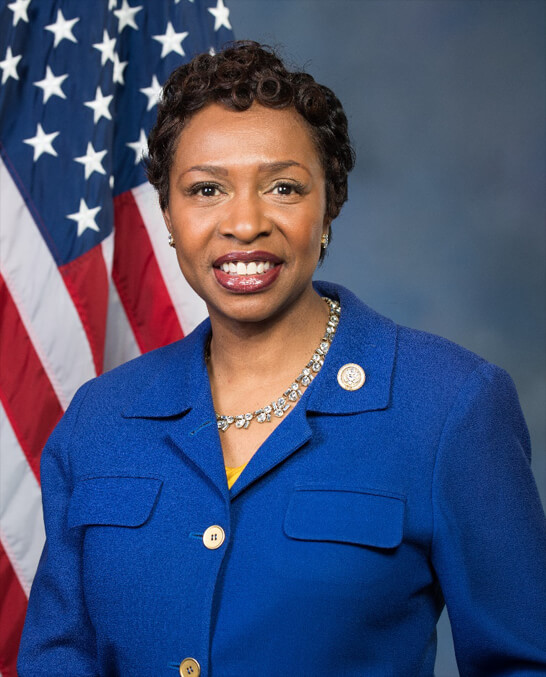In each Ten Minutes with a Changemaker segment, members of the Next Century Cities team sit down with a local, state, or federal representative to explore broadband access in their respective communities. U.S. Representative Yvette Clarke (NY-09) was our guest on June 11, 2020. You can watch her full interview here.
 Congresswoman Yvette D. Clarke represents New York’s Ninth Congressional District located in Brooklyn.
Congresswoman Yvette D. Clarke represents New York’s Ninth Congressional District located in Brooklyn.
Clarke is a leader in the tech and media policy space as co-chair of the Smart Cities Caucus and co-chair of the Multicultural Media Caucus. Congresswoman Clarke believes smart technology will make communities more sustainable, resilient and livable and works hard to ensure communities of color are not left behind while these technological advancements are made. Clarke formed the Multicultural Media Caucus to address issues related to the state of diversity and inclusion in the media, telecom and tech industries. Clarke is one of the Co-Chairs of the Congressional Caucus on Black Women and Girls, which develops programs to support the aspirations of Black women of all ages, Congresswoman Clarke is also the co-chair of the Medicare for All Caucus where she is fighting for the right to universal health care.
Representative Clarke thoughtfully responded to the following questions which framed our discussion.
How does the digital divide manifest itself in your community?
Far too often, when the ‘digital divide’ is discussed, it is in the context of the gap between urban and rural America. Although this is correct, there is another digital divide that separates the Nation. In my district, the divide is evidenced by the impacts of income inequality and systemic racial discrimination.
New York City, as a whole, had several barriers to closing this divide that created broadband deserts where major carriers didn’t even bother to lay down fiber, or any other means of bringing broadband into low-income communities. As you may know, the term “broadband desert” is defined as a community in an urban area where fewer than 33 percent of residents lack access to sufficient broadband service.
Additionally, during the COVID-19 pandemic, I’ve heard from my constituents who are in need of affordable broadband access. We must ensure that Americans – including my constituents – have adequate broadband. This is paramount as we fortify our utilities in preparation for a potential second wave of coronavirus to better socially distance.

What do you want the residents in your district to know about your work?
I am a co-founder and co-chair of the Congressional Caucus on Smart Cities and the Vice Chair of Energy and Commerce, which has jurisdiction on technology and telecommunications issues – including addressing the digital divide.
It has been a large effort to ensure that our community is not left out of these conversations that would impact this and future generations. This is why I co-lead the H.R. 4486, the Digital Equity Act of 2019, along with my colleagues Congressman Jerry McNerney and Assistant Speaker Ben Ray Luján, to close gaps in broadband adoption and to promote digital skills training and digital literacy.
This is only one of several legislative actions that I have worked on. My office has also been in constant communications with the Federal Communications Commission about the need to close this divide and ensure our communities are connected.
Is there a way for us to achieve universal broadband connectivity?
Let me first say that, in 2020 the Internet is not a luxury; it is a necessity and critical to participating in the workforce, economy, academia, healthcare, etcetera.
We must achieve universal broadband connectivity. There are very clear issues that we need to address to make this a reality. We must address affordability and availability to make this idea come to fruition.
What is the cost if we are unable to address the digital divide?
The costs are high if America does not address the digital divide. If we aim to maintain our global wireless leadership there needs to be more understanding that our leadership means billions in economic growth and millions of jobs for Americans in the development of smart city technologies and the Internet of Things. Thus, it would be imperative for all Americans to have access to affordable broadband.
We find that the technology can address environmental justice issues by decreasing the levels of pollutants emitted into the atmosphere, which in turn would better health outcomes.
In education, we can have stronger 5G networks so our children can protect themselves by staying home and continuing their education like those in my district of Brooklyn.
In health care, Black people are disproportionately affected by a range of chronic diseases – evidenced by COVID-19. 5G technology can help streamline communications for sensors that track and report on the health status of patients.
This all means nothing if we do not ensure that this gap in connectivity is addressed and ensure that many communities will be not left behind in the digital divide.
Information is power and no matter someone’s income level nor the location where they live should impact their access to broadband internet.
Next Century Cities is committed to bringing awareness to broadband issues present in communities around the country and elevating those concerns to the national stage in order to effect positive change. To learn more about what we are doing to expand broadband access, check out our news updates.
